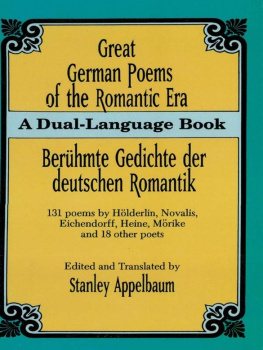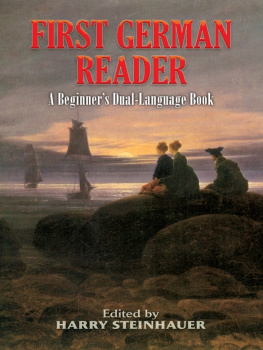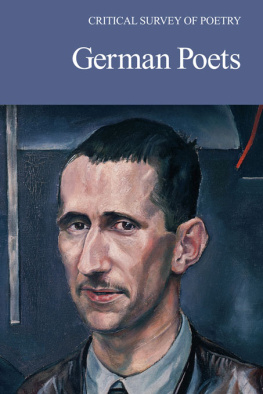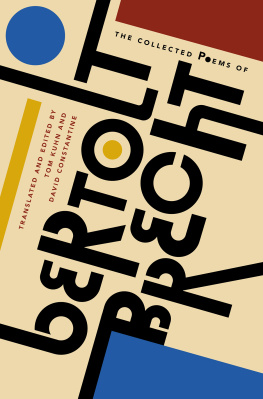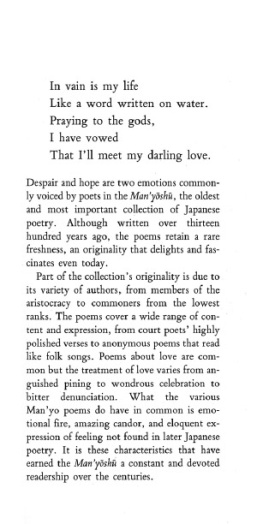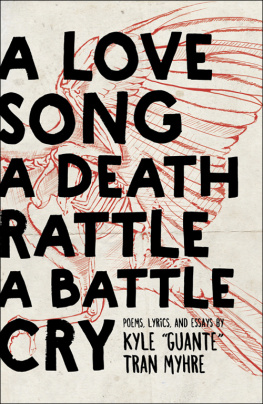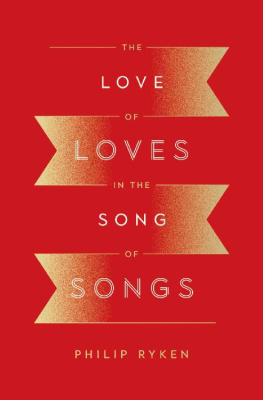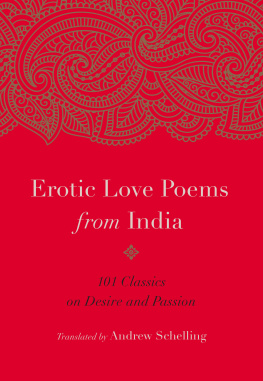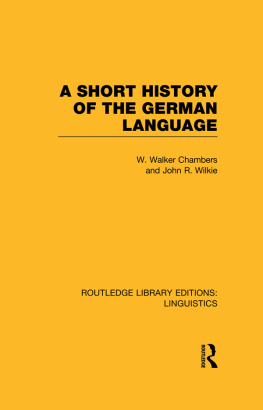This anthology is dedicated to Gareth Jones TRANSLATORS NOTE
The decision to create this book came from reading anthologies edited by Leonard Forster, Ingrid Kasten, Stephan Mller and Hans-Joachim Simm. The texts follow those in the works below. This is not a critical edition, and I have adopted editorial conjectures without indicating these in the German and without indicating textual variants. I have kept endnotes to a minimum because this is intended as a literary work rather than a work of scholarship. The order of the poems is chronological, although I have grouped the Old High German spells and verses together.
I have used the following sources: Forster, L. (ed.) Frauenlieder des Mittelalters (Stuttgart: Reclam, 1990); Mller, S. (ed.) Althochdeutsche Literatur (Stuttgart: Reclam, 2007); Simm, H.-J. (ed.) Liebesgedichte des Mittelalters (Berlin: Insel, 2010). (ed.) Liebesgedichte des Mittelalters (Berlin: Insel, 2010).
CONTENTS
OLD HIGH GERMAN VERSE MIDDLE HIGH GERMAN VERSE
| ANONYM (1)-(3) | ANONYMOUS (1)-(3) |
DER VON KRENBERG DIETMAR VON AIST HARTMANN VON AUE HEINRICH VON MORUNGEN WALTHER VON DER VOGELWEIDE WOLFRAM VON ESCHENBACH
STEINMAR INTRODUCTION The present volume offers a selection of the earliest German poetry, from its beginnings until its medieval flourishing. The translations are from Old and Middle High German, terms that demand explanation. By High German, linguists designate the West Germanic dialects that underwent the Second Sound Shift, a change in pronunciation originating in the highlands of the south (hence High German) and which differentiated these dialects from Low German. The shift is still discernible if we compare contemporary English (the descendant of Low German) and contemporary German (the descendant of High German): thus English has pound, tame, daughter and brother, where German has Pfund , zahm , Tochter and Bruder . The term Old High German designates the shifted German language from the eighth century to the middle of the eleventh century, by which time the texts we possess have changed sufficiently to be labelled Middle High German. By the time of Martin Luther (1483-1546), who translated the Bible, the language can be classified as New High German.
OLD HIGH GERMAN VERSE I heard it said that two men, champions, met between two armies and prepared to do battle, father and son Or rather, I read it, in the Hildebrandslied [Song of Hildebrand], the oldest recorded poem in High German, represented by a single manuscript that has been dated at around 800, though it looks back to an older Indo-European past.
The manuscript is incomplete and the result of the fight is not mentioned and must be inferred from similar stories in other languages, which indicates how precarious the survival of the oldest German literature is. We have the Roman historian Tacituss assurance in the Germania that song was important to the Germanic tribes, but little has survived in written form; the poems we have and value are typically the product of anonymous monks working in scriptoria, taking a break from the copying of sacred work in order to record poetry in their own dialects. Even though few works of literary value are extant in Old High German, with nothing on the scale of the Anglo-Saxon Beowulf , what does remain can offer an album of a time and a way of seeing the world, through texts that continue to have poetic effects, both in the source language and I hope in translation. This anthology includes: the ], a remarkable attempt to describe the time before creation; a number of invocations, most of which are Christian but one pre-Christian; a few marginal annotations written on wet afternoons. The poems offer an overview of a society in transition from a pagan worldview to a Christian one. The human form of life that is depicted is one we can still recognise.
We can shiver as Hildebrand laments that a wicked fate is working itself out that will force him to kill the son who does not recognise him. We can marvel at the imagery of the worlds end in Muspilli , whether or not we share the poems Christian belief. And, in our world where bees are vanishing, we can sympathise with the beekeepers spell for a swarms return. Human nature may not have changed as much as the German language.
MIDDLE HIGH GERMAN VERSE In contrast to Old High German Literature, a large corpus of Middle High German lyric poetry survives. It is possible, for example, to publish a whole volume of lyrics by Heinrich von Morungen, by whom more than thirty texts survive. The Middle High German period from the twelfth to the fourteenth century has been termed the Bltezeit [time of flourishing] by scholars.
This was the world of the secular court, where the minstrel functioned as entertainer and instructor for his listeners. Longer poems have also survived, such as courtly romances by Gottfried von Strassburg, Hartmann von Aue, and Wolfram von Eschenbach, or the anonymous epic Nibelungenlied [Song of the Nibelung]. It would have been interesting to include excerpts from these works of poetic genius, but considerations of space mean that only complete shorter works have been chosen. Middle High German lyric verse is represented here by eleven poets of the Minnesang [love song], of whom eight can be identified by name. The lyrics typically depict expressions of love to a lady, in the hope of reward. As the term Minnesang suggests, these texts would have been sung, but in most cases the music has been lost.
We should not read the words too literally as a record of minstrels having their way with noble women, because Minnesang was a public performance rather than an expression of private passion. The Nibelungenlied , for example, contains an episode in which the minstrel Volker sings at court to a queen and is rewarded for his praises by a gift of bracelets, rather than by anything more intimate. The poets engage in a highly professional ritual, composing on the basis of cognitive metaphors that still ring true: LOVE IS A TRAP; LOVE IS A GAME; LOVE IS WAR . We continue to use these metaphors, as can be shown by juxtaposing Minnesang with a contemporary cultural phenomenon, the Eurovision Song Contest. Heinrich von Morungen (who died around 1220) wrote a song, included here, in which he tells his lady that she is a sweet assassin whose lack of care will surely kill her faithful servant, but that he will nonetheless continue to serve her, even beyond the grave. In Oslo, 2010, the German singer Lena Meyer-Landrut won the Eurovision with her performance of Satellite, in which she offers love the assurance that she will carry on loving, whether love is sweet or cruel.
All the elements of Minnesang are here: public performance; cognitive metaphor; the power of love. The lyricists of the Middle Ages did, however, have other themes. I include, for example, a poem by Walther von der Vogelweide that laments growing old, and that exhorts his listeners to support the call to crusade of Frederick II.
THE TRANSLATION In presenting this edition, I have been able thanks to the philosophy of Arc Publications to place my translations opposite the source texts, so that the translation can be shown at least to aim to represent the Old or Middle High German. The relative shapes of source and target text become relevant, whilst the reader with some knowledge of German will spot ancestors of contemporary vocabulary on the left-hand pages. The song form of Minnesang becomes apparent in the tightly constructed stanzas and often intricate rhyme schemes of the courtly lyrics. When translating, I have looked at each individual source text and formed a strategy accordingly.
An example of this is the rendering of the Middle High German as alas, in order to suggest the antiquity of that poem. Most poems in this anthology use full rhyme, a consequence of their original setting as song lyrics. I have tried to suggest rhyme by a variety of techniques, from full rhyme to assonance, in order to show the highly formal nature of the corpus, although it should be remembered that the texts we possess are variants. In the world of performed poetry, every creation is a recreation, just as these translations are my creation of the world of the earliest German verse. Some of the Old High German texts show alliteration as a binding technique, and again this is suggested in the translations. Given that many of the poems in this anthology were originally composed as lyrics for oral performance, I have paid attention to the rhythms of the source texts and have attempted to produce target texts that also work rhymically.
Next page

